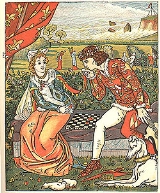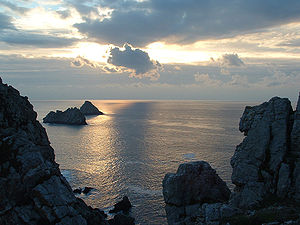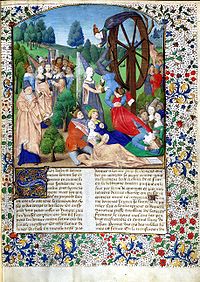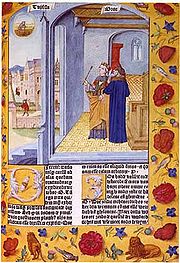
The Franklin's Prologue and Tale
Encyclopedia

The Canterbury Tales
The Canterbury Tales is a collection of stories written in Middle English by Geoffrey Chaucer at the end of the 14th century. The tales are told as part of a story-telling contest by a group of pilgrims as they travel together on a journey from Southwark to the shrine of Saint Thomas Becket at...
by Geoffrey Chaucer
Geoffrey Chaucer
Geoffrey Chaucer , known as the Father of English literature, is widely considered the greatest English poet of the Middle Ages and was the first poet to have been buried in Poet's Corner of Westminster Abbey...
. It focuses on issues of providence, truth, generosity and gentillesse in human relationships.
Structure of the Tale
A franklinFranklin (class)
The term franklin denotes a member of a social class or rank in England in the 12th to 15th centuries.In the period when Middle English was in use, a franklin was simply a freeman;...
was a medieval landowner, and this pilgrim's words when interrupting the Squire are often seen as displaying his social status of diminutio. Other such devices are employed throughout the tale.
The story opens by recounting how two lovers decide that their marriage should be one of equal status, although they agree that, in public, Arveragus should make decisions so as not to draw suspicion. The idea of women having equality with men was unheard of at the time, and would have been socially unacceptable; this is why they choose to conceal it. Arveragus then travels to Britain to seek honour and fame, a common thing for knights to do at that time. He leaves Dorigen alone in France near the coastal town of Pedmark (today Penmarc'h) the province of Armorik (or Brittany
Brittany
Brittany is a cultural and administrative region in the north-west of France. Previously a kingdom and then a duchy, Brittany was united to the Kingdom of France in 1532 as a province. Brittany has also been referred to as Less, Lesser or Little Britain...
as it is now known). She misses her husband terribly while he is gone, and is particularly concerned that his ship will crash while returning home on the black rocks of Brittany.

When the "rokkes" vanish, Aurelius confronts Dorigen and demands that she fulfill her bargain. She and her husband agonize over her predicament; for by this time Arveragus has returned safely. During this period Dorigen lists numerous examples of legendary women who killed themselves to maintain their honor. Dorigen explains her moral predicament to her husband who calmly says that in good conscience she must go and keep her promise to Aurelius.
However, Aurelius himself defers to nobility when he recognizes that the couple's love is true, and Arveragus noble; he releases Dorigen from her oath. The magician-scholar is so moved by Aurelius' story that he cancels the enormous debt that Aurelius owes him.
Background to the Tale
As the Franklin says in his prologue, his story is in the form of a Breton laiBreton lai
A Breton lai, also known as a narrative lay or simply a lay, is a form of medieval French and English romance literature. Lais are short , rhymed tales of love and chivalry, often involving supernatural and fairy-world Celtic motifs...
, although it is in fact based on a work by the Italian poet and author Boccaccio
Giovanni Boccaccio
Giovanni Boccaccio was an Italian author and poet, a friend, student, and correspondent of Petrarch, an important Renaissance humanist and the author of a number of notable works including the Decameron, On Famous Women, and his poetry in the Italian vernacular...
(Filocolo 1336 retold in the 1350s as the 5th tale on the 10th day of the Decameron) in which a young knight called Tarolfo falls in love with a lady married to another knight, extracts a promise to satisfy his desire if he can create a flowering Maytime garden in winter, meets a magician Tebano who performs the feat using spells, but releases her from the rash promise when he learns of her husband's noble response. But in Chaucer's telling, the Franklin adapts the style so that it is barely recognizable as a Breton lai. The relationship between the knight and his wife is explored, continuing the theme of marriage which runs through many of the pilgrims' tales. Whereas most of the Breton lais involved magic and fairies, the usual fantastical element is here modified by the use of science to make rocks disappear rather than a spell. This is fitting for a writer like Chaucer who wrote a book (for his son Lewis) on the use of the astrolabe
Astrolabe
An astrolabe is an elaborate inclinometer, historically used by astronomers, navigators, and astrologers. Its many uses include locating and predicting the positions of the Sun, Moon, planets, and stars, determining local time given local latitude and longitude, surveying, triangulation, and to...
, was reported by Holinshed to be "a man so exquisitely learned in al sciences, that hys matche was not lightly founde anye where in those dayes" and was even considered one of the "secret masters" of alchemy
Alchemy
Alchemy is an influential philosophical tradition whose early practitioners’ claims to profound powers were known from antiquity. The defining objectives of alchemy are varied; these include the creation of the fabled philosopher's stone possessing powers including the capability of turning base...
.
While the idea of the magical disappearance of rocks has a variety of potential sources, there is no direct source for the rest of the story. The rocks possibly come from the legends of Merlin performing a similar feat, or might stem from an actual event. In 2000 a paper was published showing that the magician in the Franklin's Tale attempts to make the rocks disappear in December. In fact, on December 19, 1340 (commonly viewed as the year of Chaucer's birth) the sun and moon were both at their closest distance to earth; an event which will not recur till 3089 and which causes massive high tides. The theme of the story, though, is less obscure—that of the "rash promise", in which an oath is made that the person does not envisage having to fulfill. The earliest examples of the "rash promise" motif are found in the Sanskrit
Sanskrit
Sanskrit , is a historical Indo-Aryan language and the primary liturgical language of Hinduism, Jainism and Buddhism.Buddhism: besides Pali, see Buddhist Hybrid Sanskrit Today, it is listed as one of the 22 scheduled languages of India and is an official language of the state of Uttarakhand...
stories of the Vetala
Vetala
A vetala is a ghost-like being from Hindu mythology. The vetala are defined as spirits inhabiting corpses and charnel grounds...
as well as Bojardo's Orlando Innamorto and Don Juan Manuel's Tales of Count Lucanor.
Commentary


Summa Theologica
The Summa Theologiæ is the best-known work of Thomas Aquinas , and although unfinished, "one of the classics of the history of philosophy and one of the most influential works of Western literature." It is intended as a manual for beginners in theology and a compendium of all of the main...
and Boethius' De Consolatione Philosophiae were important influences on Chaucer in writing the Franklin's Tale. Hodgson likewise emphasizes how in phraseology reminiscent of Boethius's De Consolatione Philosophiae, Dorigen ponders why a wise and benevolent God could create in "thise grisly feendly rokkes blake" means to destroy and to produce no good "but evere anoyen". DW Robertson considers that Arveragus comes across as "not much of a husband"; he exerts himself with many a labour and many a "great emprise" not for the sake of becoming virtuous, but to impress his lady and when he learns of her rash promise he advises her to go ahead and commit adultery, but only to keep quiet about it "up peyne of deeth." This sour view of Arveragus is disputed by Bowden who refers to Arveragus' honest belief that "trouthe is the hyest thyng that man may kepe" so that he too may be called "a verray parfit gentil knyght". Gardner considers that the Franklin's Tale comes close to Chaucer's own philosophical position that all classes must be ruled by "patience."
On the theme in the Canterbury Tales about freedom and sovereignty in marriage, the Franklin's Tale arguably explores three successive acts of conscience
Conscience
Conscience is an aptitude, faculty, intuition or judgment of the intellect that distinguishes right from wrong. Moral judgement may derive from values or norms...
or gentilesse springing from rich human generosity: by Dorigen's husband, her suitor and the magician who cancels the debt owed to him. Howard, however, considers it unlikely that the Franklin's Tale represents Chaucer's view on marriage, the Franklin being "not the sort of character to whom Chaucer would assign a tale meant to settle an issue." Cooper expresses the view that the absolutes considered in the tale are moral qualities (patience, fredom or generosity, gentillesse, trouthe): "Averagus comforts his wife, and then bursts into tears. He and the other men make their choices for good without privileged knowledge and out of free will: a free will that reflects the liberty given to Dorigen within her marriage. A happy ending requires not that God should unmake the rocks, but that a series of individuals should opt to yield up and give, rather than take." Whittock considers that this Tale represents, beyond the Franklin's own consciousness of it, a 'fearful symmetry' in the universe; where acting from conscience
Conscience
Conscience is an aptitude, faculty, intuition or judgment of the intellect that distinguishes right from wrong. Moral judgement may derive from values or norms...
on qualities of truth, generosity and gentillesse must shift from being a secular ethical attitude to one that represents man's grateful (but always imperfect) response to the bounty of a transcendent consciousness.
Spearing writes that one of the important messages of the Franklin's Tale is that our vision of the right way to live, or how to do the right thing in problematic circumstances "does not come to us directly from God or conscience, but is mediated by internalised images of ourselves as judged by other human beings. The very terms we use to assess conduct (right, decent, mean, rotten,, and so on) belong to languages we did not invent for ourselves, and their meanings are given by the communities to which we belong."
External links
- The Franklin's Tale with interlinear translation
- Modern Translation of the Franklin's Tale and Other Resources at eChaucer
- The Franklin's Tale in Modern English free translation

